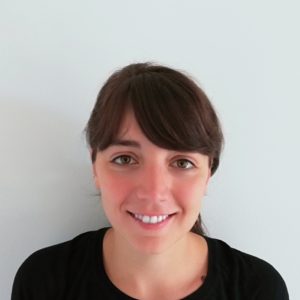
Virginia Ajani
Post-doc at ETH Zurich
Former PhD student at CosmoStat
| Contact Information | |
| E-mail: | vajani@phys.ethz.ch |
| PhD supervisors: | Valeria Pettorino, Jean-Luc Starck |
I am currently a post-doc at the Cosmology Research Group of ETH Zurich.
From 2018 to 2021, I was a PhD student in the CosmoStat laboratory. My PhD thesis was about Higher order statistics for cosmology: likelihood development for future surveys like Euclid.
Research Interests
My PhD research focused on the development of statistical tools to analyse data coming from next-generation galaxy surveys like Euclid in the context of weak gravitational lensing. During the first part of my thesis I have built a pipeline to investigate the impact of different multi-scale filtering techniques on the cosmological parameter constraints using weak lensing peak counts to constrain the sum of neutrino masses with the final aim of finding optimal methods to extract cosmological information from the input data. If you are interested in more details you can find here the paper. I am very interested in machine learning , during my PhD formation I have attended courses on it specifically on application to astrophysical data. I have implemented a new higher order summary statistics called the starlet l1-norm that can help to significantly improve the cosmological constraints for future galaxy surveys like Euclid. I am working on higher order statistics for Galaxy Clustering and applied my pipeline to get constraints with peak counts using CFIS data.
I have worked also as a member of the Euclid Consortium where I contribute to the Euclid Inter Science Taskforce on Likelihood.
I was one of the co-organisers of our group's Journal Club and CosmosClub. If you would like to give a talk and meet the CosmoStat group you can now contact Tobias or Denise.
Talks and workshops
- Remote Talk at Journal Club at Lorentz Institute, Leiden Observatory, June 2021
- Remote Talk at Institute of Cosmology and Gravitation, University of Portsmouth, January 2021
- Astrophysics Talk at INAF Osservatorio di astrofisica e scienza dello spazio, Bologna, November 2020
- Remote Seminar at Cosmology and Astroparticle physics group, University of Geneva, November 2020
- Remote Seminar at Astrophysics Journal Club, University of Milano Statale, October 2020
- Remote Seminar at Columbia University Department of Astronomy, New York, October 2020
- Talk at Colloque Nationale Action Dark Energy, Institut Henri Poincaré, Paris, November 2019
- Talk at Euclid France, Orsay, Institut d'Astrophysique Spatiale, November 2019
- Talk at Clusters and high-order statistics from weak-lensing mass maps splinter at Euclid Consortium Helsinki, June 2019
- Likelihood Free Inference Workshop, Flatiron Institute, New York March 2019 - (workshop)
Education
Before coming to CosmoStat I graduated in July 2018 and obtained a MSc in Theoretical Physics at University of Turin, bringing as a topic of my master thesis the Spherical Collapse of fuzzy dark matter.
From April to September 2017, I had a six-month research experience as visiting student at the Cosmology group of Max Planck Institut for Astrophysics (MPA) in Garching, where I worked on the spherical collapse of dark matter halos using ultra-light axions as alternative dark matter candidate.

